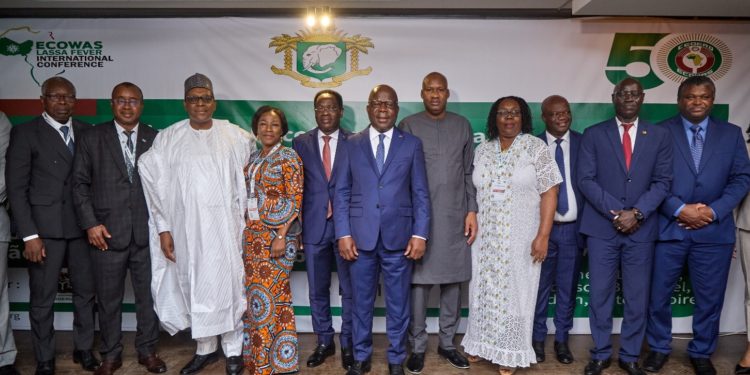By Kemo Cham
In a historic display of regional collaboration in the fight against Lassa fever, Ministers of Health in the Economic Community of West African States (ECOWAS) have pledged to advance the development of vaccines against one of the region’s major public health threats.
The Ministers from the 12-member bloc made the joint commitment during a Ministerial meeting held on the eve of the ongoing Second Lassa fever International Conference (ELFIC2025) in the Ivorian capital, Abidjan. The conference is convened by the West African Health Organization (WAHO), which said in a statement that the Ministers in a communique issued at the end of the meeting reinforced the region’s shared leadership in confronting the Lassa fever virus which causes significant health, economic and societal harm.
Lassa fever is a viral illness that is similar to Ebola. And both are endemic to Sub Saharan Africa, while Lassa fever is known to be common to West Africa. Lassa fever is also less severe, compared to Ebola, with about 1 percent fatality rate, according to the World Health Organization (WHO).
Data shared by WAHO indicate that hundreds of thousands of people in West Africa are estimated to be affected by Lassa fever each year, with the disease causing almost 4,000 deaths and $110 million in productivity losses in the region annually. The agency says the potential impact of the disease is set to worsen, with modelling research predicting up to 600 million people could be at risk of Lassa fever infection by 2050 as a result of climate change and population growth.
Despite its devastating impact, there are currently no licensed vaccines to protect against Lassa fever. The most advanced vaccine candidate for the disease is being developed by the International AIDS Vaccine Initiative (IAVI), with funding from the Coalition for Epidemic Preparedness Innovations (CEPI) and the European & Developing Countries Clinical Trials Partnership.
IAVI’s Lassa fever vaccine candidate – rVSVΔG-LASV-GPC[1] – is currently being evaluated in a Phase IIa clinical trial to evaluate its safety and immunogenicity in Ghana, Liberia and Nigeria. It is described as the most advanced study of a Lassa fever vaccine to take place anywhere in the world.
“Through the communiqué, the Ministers reaffirmed their political endorsement of accelerating Lassa fever vaccine readiness as a regional strategic health priority and a cornerstone of pandemic preparedness, underscoring its dual role in strengthening national systems and collective resilience,” WAHO said in a press release shared with the media on Tuesday. “They recognised that Lassa fever could serve as a model towards broader integration and coordination of financing efforts.”
The Ministers, according to the statement, committed to supporting the development of the IAVI vaccine candidate through a collaborative co-funding approach and joint action to mobilise and secure resources through advocacy and regional coordination. They also pledged to strengthen country and regional platforms to ensure that clinical trial sites, laboratories, regulatory authorities and community engagement efforts across West Africa are ready to enable the late-stage clinical research needed to advance a vaccine to licensure and to bolster the region’s response to other epidemic and pandemic disease threats.
The Ministerial meeting was attended by eleven ministers or their representatives, among them Sierra Leone’s Deputy Minister of Health 1, Dr Charles Senesie.
Dr. Muhammad Ali Pate, Coordinating Minister for Health and Social Welfare of the Federal Republic of Nigeria is quoted in the statement saying that their move represents a new path for West Africa in its fights against Lassa fever.
“For decades, Lassa fever has silently taken lives, eroded livelihoods, and tested the resilience of our health systems. Here in Abidjan, West Africa is showing a new path: countries uniting not only to call for a vaccine, but to co-finance and prepare the systems that will make it real,” Dr Pate said.
“What we commit to today is bigger than one disease; it is a statement that Africa can mobilise its science, align its financing, and contribute decisively to global preparedness,” he added.
Dr. Melchior Aissi, Director General of WAHO, expressed pride that his organization convened and coordinated the “landmark” commitment.
“ECOWAS Ministers have agreed not just to endorse a vaccine, but to co-finance it together — showing that West Africa is ready to lead on solutions to Lassa fever and pandemic threats. Regional solidarity is our greatest asset, and WAHO will continue to drive this united approach,” he said.
The 2nd Lassa fever International Conference, which runs from 8-11 September 2025, is being convened under the theme: “Beyond Borders: Strengthening Regional Cooperation to Combat Lassa Fever and Emerging Infectious Diseases”.
The event brings together scientists, public health experts, vaccine developers, policymakers, civil society and regional stakeholders to share insights, review progress and forge new partnerships aimed at accelerating vaccine development and strengthening Lassa fever control efforts.






















